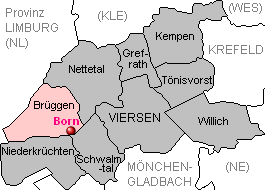Born (Bruggen)
|
Born
Brüggen municipality
|
|
|---|---|
| Coordinates: 51 ° 14 ′ 43 " N , 6 ° 12 ′ 48" E | |
| Residents : | 2000 |
| Incorporation : | January 1, 1970 |
| Postal code : | 41379 |
| Area code : | 02163 |
Born (Dorf am See) is a district of the municipality of Brüggen on the Lower Rhine ( North Rhine-Westphalia ) with about 2000 inhabitants on the Schwalm .
history
Born is a name that speaks. "Borne" was the Middle Low German name for a naturally flowing spring fountain . So-called stratified water escapes through the sloping terrain from Boisheimer Landstrasse to Borner See . So there is a close connection between the water-related name "Born" and the shape of the terrain.
Born was first mentioned in a document in 1136 as "in Borno"; Born ( Motte ) castle was mentioned for the last time in 1410 . In 1494, Duke Wilhelm von Jülich-Berg acquired the castle and land of Brüggen, to which Born also belonged. The office of Brüggen was an important base of the Duchy of Jülich-Berg without interruption until the French occupation in 1794. In the 17th century, the parish of Born included Brüggen and the honors Genholt, Genrohe, Haverslohe, Lüttelbracht, Oebel and Gelagweg. Under French rule Born became part of France in 1794 and belonged as a municipality to the canton of Bracht, Arrondissement de Crévelt , Département de la Roer . The law of February 17, 1800 changed the administrative organization; the still independent municipalities of Born and Brüggen were combined to form a mayor's office (Mairie) Brüggen. After the Congress of Vienna Born and Brüggen became Prussian in 1815 . In 1819 the municipality of Brüggen with the farmers Gelagweg and Oebel, the homestead Venn-Mühle and the municipality Born with the farmers Bornermühle, Genholt, Genrohe, Haverslohe and Lüttelbracht belonged to the mayorry of Brüggen. The new municipal code of March 11, 1850 assured the municipalities greater independence so that the councils of the municipalities could better represent their interests. In 1936, due to a territorial reform, the independent rural communities Born and Brüggen were merged to form a political unit under the name "Municipality of Brüggen". On January 1, 1970, the independent municipalities of Bracht and Brüggen were merged to form the new municipality of Brüggen as part of the municipal reorganization.
Attractions
- Catholic parish church of St. Peter Born
- Borner Mill
- Borner See
- Born manor
- Marian column
- Joseph Column
- Crossroads at the Borner Mühle
Awards
For the fourth time, the village of Born took part in the state competition " Our village should be more beautiful - our village has a future".
- 1997 and 2000 Born took third place (bronze)
- In 2003 Born took second place (silver) and also the special award of the NRW Touristikverband e. V. for the successful use of the local opportunities for the development of a gentle tourism with the inclusion of cultural offers.
- In 2006 Born won first place (gold) and qualified to participate in the 2007 national competition, in which third place (bronze) was achieved.
Individual evidence
- ↑ Martin Bünermann: The communities of the first reorganization program in North Rhine-Westphalia . Deutscher Gemeindeverlag, Cologne 1970.





